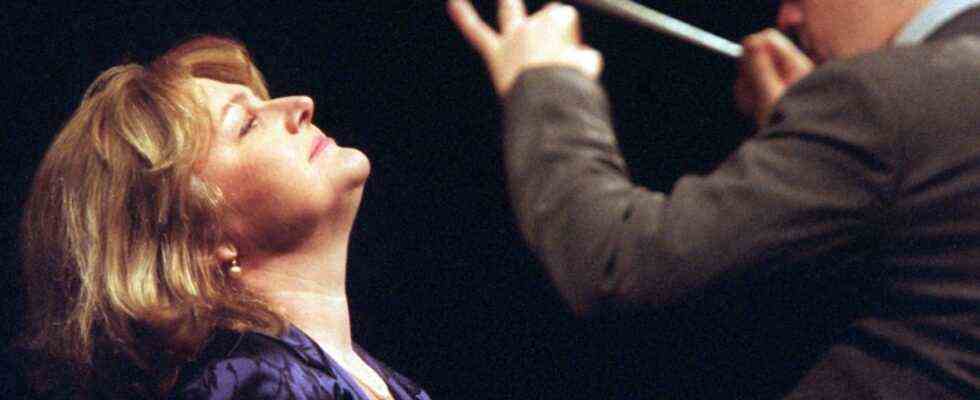The opera must “draw tears, frighten people and let them die through singing”, explained Vincenzo Bellini to the librettist of his last opera “I puritani”. No other singer has come so overwhelmingly close to this demand as the “Queen of Belcanto” Edita Gruberová, the undisputed “Primadonna assoluta” of the Bavarian State Opera. As Elvira, she drew the Munich audience right into the last coloratura fold of madness. In 2000, she still seemed to be at the zenith of her fabulous 51-year career. At the same time, she enchanted with pure beauty: with weightlessly sliding up and down scales, prismatic shimmering trills, a narcotic “messa di voce” – the seamless swelling and waning of a tone – and that incomparably floating pianissimo that none of it imitates. Gruberová performed even the most breakneck vocal acrobatic madness with the weightless precision of a prima ballerina and at the same time inspired him with her nuanced art of phrasing. Bellini had thrown at his troubled lyricist Carlo Graf Pepoli that a musical drama is only good when it makes no sense. Gruberová, however, sang such a beautiful Elvira that one discovered all meaning in the lavish abundance of the Belcantist glamor, that one suddenly grasped the seriousness and deeper meaning of the art of vocal ornamentation. While still on the tightrope of coloratura, she demonstrated how deeply Bellini penetrates the souls of his characters with his Melos, instead of only effectively promoting their emotional states.
She grew up in uncertain circumstances. Singing gave her security
The star roles of Gruberová were initially different: the star-flaming queen in Mozart’s “Magic Flute”, with which she made her debut at the Vienna State Opera in 1970, the Zerbinetta in Richard Strauss’ “Ariadne auf Naxos”, with which she made her breakthrough six years later at the same house and Donizetti’s Lucia di Lammermoor, with whom she first performed at the New York Met in 1988 and three years later in Munich. She has given almost two hundred performances of each of these roles – more than Callas with all her roles in her entire life – and has not only maintained her rank as the queen of coloratura, but has continued to develop, and even once again in the autumn of her career Reinvented: When Gruberová celebrated one of her greatest triumphs with Elisabetta I in Gaetano Donizetti’s “Roberto Devereux” at the National Theater in 2004, it was a dramatic character actress that was experienced.
“If Strauss had heard that,” Karl Böhm is said to have raved about her Zerbinetta
“When it comes to opera stars, people always believe that you come from a great background, that you have always been encouraged,” she said in an interview. You, on the other hand, actually “got to know life”. Born on December 23, 1946 behind the Iron Curtain in Bratislava, she grew up with a Hungarian mother and a German-born alcoholic father who, as an anti-communist, survived five years imprisonment for treason. Singing gives her security. At the age of 22 she made her debut as Rosina at the National Theater in her hometown, and in 1970 she was engaged at the Vienna State Opera – where for six galley years she was only allowed to sing the cues, the “Wurz’n”, until she finally amazed everyone with the Zerbinetta. “If Strauss had heard that,” Karl Böhm is said to have raved. From now on the houses tear themselves around the Gruberová. As Violetta in Verdi’s “Traviata”, she said she had one of her most beautiful appearances in 1989 under the brilliant Carlos Kleiber at the New York Met. Above all, however, she throws her vocal gold into the balance in order to bring the neglected bel canto repertoire of Donizetti and Bellini back onto the stage: Maria Stuarda, Beatrice di Tenda, Anna Bolena or Linda di Chamounix. Her soul portrait of the deeply lonely Lucia di Lammermoor makes the audience catch their breath. Donizetti’s Lucrezia Borgia brings Gruberová back to the Bavarian State Opera for the first time in 160 years.
Iron discipline, talent and the luck to meet the right teachers at the right time – this is how this Assoluta herself described the secret of her success. She carefully built up her repertoire and asserted herself against the unreasonable demands of the company when she rejected directors because she only felt that she was being treated as a prop, or by insisting on breaks for her vocal cords between performances. To keep the strings in hand, she also founded her own record label. In 2019 she took her stage farewell with a performance of “Roberto Devereux” at the National Theater. Red rose petals rained down on her in the storms of applause, and State Director Nikolaus Bachler sank to his knees in front of her. Edita Gruberová died on Monday at the age of 74.

